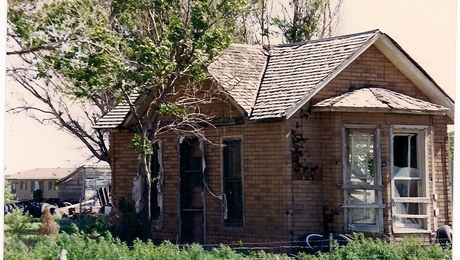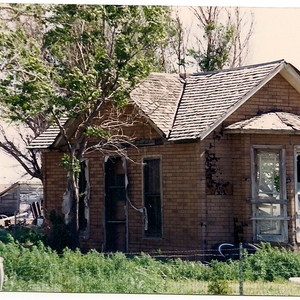*
Last Friday and this Monday the last two one-story homes in the 1700 block of Richmond Road in Lexington, Kentucky were demolished to make way, it is rumored, for an expansion of an existing Georgian two-story that must run about 5,000 square feet in its present state. The first one-story has a brick exterior, the other was built of stone. Both were fine homes. In fact, that block of Richmond Road accommodates, arguably, some of the finest addresses in Lexington. I watched the lighting fixtures, raised-panel casework and Doug Fir rafters over the dining room of the stone house fall to dust and splinters yesterday. That’s all I could stand.
Do any of you know of any municipalities that require recycling of all possible building materials as a condition of allowing a tear-down? If so, I’d like to hear about them. If not, isn’t it time for such legislation to be enacted? –Karl Garson, Lexington, KY


















Replies
*
karl.. who would bear the expense...?
where would you store the recycleable materials...?
which of your do-good neighbors would you appoint to the boardd that would issue the permits and oversee the recycling...
nice thoughts..
but fraught with expense..
seed the back cover of theis old house.. they encourage recycling ... but they are not always successful..
*Mike, I understand. But the high expense of recycling is part of the point. Make a tear down expensive and fewer might occur.
*Karl, why didn't you go ask if you could recover some of it? Don't know of any municipalities that require it, but there are always, particularly around large cities, salvage yards that could make use of it. It's the trade off of the cost of rescuing and warranting it (and then getting the cost passed on to the final customer), versus what most Americans want, cheap and fast.
*Jason, Your comment incorporates part of the solution. At the very least, in my opinion, municipalities should require some sort of an "available for salvage" notification accomapnied by a reasonable wait for replies. But that's a future-hope issue. In this case, it all happened very fast. The houses went up for sale and sold signs went up. Then, on Thursday, the gas company dug up their connection.I think that Mike made excellent points too, all of them incorporating the kernel of a solution, which, after all, is what I'm searching for.
*i But the high expense of recycling is part of the point. Make a tear down expensive and fewer might occur. Here's a different perspective of that viewpoint.What if (God forbid) a tornado damaged YOUR older home to the point that it was no longer safe to live in. Local laws would make it necessary for you to demolish the existing structure in order to build a new, sound, liveable house for your family. Now, with your viewpoint about recycling and the expense involved, YOU get to bear the high cost. A large portion of your insurance money (to build your new house) will go into recycling expenses. You get a lot less to build your new home with. There are always two sides of an issue. In your view, it is understandable about how you feel when rich people tear down older historic homes to make room for their new McMansion, but in the same breath, you include average homeowners in different situations. Both would be affected. The rich could probably handle the added costs, but I'd bet the average homeowner can't.Just a thought...James DuHamel
*James, Acts of God, like tornados, might grant an automatic exemption from mandatory recylcing with each tear down. Yes, I know: who's going to determine if it really is an act of God? If it were my house and I survived I'd take the insurance money and the salvage what materials I could. Not exactly on that subject, I once helped tear down a sawmill in Wisconsin and we found, among other good things, that the roof sheathing on the storage sheds was #1 match board/beaded ceiling. There are rewards to stick-by-stick teardowns.
*Well you have a problem; how to turn your philosophy into action by others who may, but probably don't, share it.You can do it by government regulation and make everything more expensive, more difficult and generally more unpleasant.Or, you can do it by putting your money where your mouth is. You can open a recycling yard. Here you buy the stuff in those old buildings. Then you market it and resell it at a profit. Everyone is happy and you make money on the deal.What you say: "No one would pay enough to make it worthwhile." Well then, the public has spoken and it is time to move on to another cause. Or, you say: "But I have a job and I don't want to change". You don't have to work at the Antique Goodies Yard. You just have to see it is in business.
*Fred B., I’d have no problem entertaining the idea of starting a recycling yard as long as those responsible for initiating tear downs could in turn be persuaded to, either voluntarily or with the prompt of legislation, introduce materials into the recycling stream instead of an ever increasing series of demolition landfills. In fact, those who might benefit from the recycled materials—Habitat for Humanity springs to mind as a single example—might supply part of the labor in exchange for some of the materials. In the example I used of my helping to dismantle a sawmill, I sold part of my share of the salvaged materials to finance some of my grad school costs.
*I live near, and work heavily (remodeling) in a small Georgia town that wasn't burned by Sherman. It is full of old historic homes that have become very valuable. The Historic Preservation Commission will not allow any house over 50 years old to be demolished (I'm sure there are some exceptions). Here you have a case where the citizens have collectively come together and said "we want to preserve the historic homes". I believe this same sort of preservation occurrs in many communities where there are sufficient numbers who support it. The same could happen in your community. However if those who see the value in these homes are in a minority, the houses will continue to be torn down. We tear down portions of old homes all the time and dispose of the material. Recycling old lumber from residential construction is in most cases economically unfeasable. The cost to remove piece by piece, transport, store, re-market, etc. far exceeds the free market value. Getting big brother involved to make it economically feasable would be a disaster. There are numerous recyclers of large timbers from old warehouses who re-saw the beams into boards and make a profit doing so. I agree that it is unfortunate that there is so much waste involved in destroying old structures, but it will continue until economically it makes sense to salvage.
*Karl, it's people like you who unthinkingly burden the world with the consequences of "Good deeds" to the point of no return. I'm in California where the do-gooders have driven us to the point of living in the dark because drilling for oil or gas is bad,nuclear is worse and power plants are only to be built in other states.You want to add another layer of hoops to jump through on top of the existing bureaucracy required to build. Who is going to do this rescue work on the things YOU decide are worth saving? Who is going to provide the insurance coverage for the salvagers? Is that another additional cost to the builder? Or will there be an additional fee paid by ALL builders to cover the costs of YOUR program?Karl, you scare me. Your kind are everywhere, doing your good deeds for the rest of us. I don't want to be good-deeded any more. The tree huggers are doing good for me and you, here the Coastal Commission has enough do-good rules to add years and untold thousands of dollars or even millions to any project within ten miles of the ocean.Wetlands are sancrosanct thanks to people like you, even the ones with no water. All done in the name of some holier than thou with good intentions.karl, I hate to see the kind of thing you are talking about happen too, but guess what? It isn't YOUR property, it isn't YOUR decision unless you want to put up YOUR money to change it. But usually your sort want to use MY money to fund your ideals. There is a piece of land here called Bolsa Chica, it is along the coast North of Huntington Beach. For the last 20(?) years it has been in and out of court and the Coastal Commission while the poor people who own it try to build houses on it. The project gets smaller and smaller as lawsuits and agreements with environmental groupe whittle it down. Each time they finally come to an agreement to build a smaller than the last time number of houses, some group of people like you files yet another lawsuit to prevent them from building.The second generation of lawyers is getting rich off this deal, and guess what? There is not one house built, and I don't think there ever will be.NONE of these environmental groups has offered to buy this property with their own money, they only offer others money or property to achieve their goals.Sorry Karl, bad idea. Joe H
*Joe, I don’t mind being thought of, even stereotypically, in association with good deeds. After all, the fact that you and I can enjoy an occasional weekend off is because a bunch of troublesome, meddling do-gooders brought the American worker the 40 hour week. And I can remember, back in the mid-60s, on an otherwise perfectly clear afternoon, having to file for an instrument approach to land at Los Alamitos Naval Air Station, up there off your I-405. If the air around you is somewhat clearer now, Joe, it’s because some do-gooder took the time to work pretty hard to make it so.But my issue is with the indiscriminate introduction of used but recyclable building materials into demolition landfills. I think that if even some of that stream can be intercepted and put back into good use we’d all be better off. I specifically think that if a person, solely for the purpose of vanity, wants to tear down a perfectly serviceable structure in order to build another one on the site, that person should bear the entire cost—from the permit stage to the sorting and cleaning of the materials—of the tear down. That, it seems to me, would make people think twice about indiscriminate, vanity- driven tear downs and retain not only the more favorable characteristics of our neighborhoods but some of our natural resources as well.And, speaking as you have, of wetlands, a builder will probably never have to wade her or his way through a bigger swamp than that created by zoning ordinances and building codes. Yikes, and double yikes! I agree.But those same troublesome ordinances and codes allow you to rest inside the home you bought with your money and not worry that I’ll build a packing plant next door on the land I just bought with my money.
*Karl:Frankly your comment; "I think that if even some of that stream can be intercepted and put back into good use we’d all be better off." betrays a rigid and self-serving way of thinking that hurts everyone. It reminds me of a comment by a pastor: "We Xxxxxxxxx's know what is right and how you should live and are willing to do anything to see that you do."(Denomination disguised so we don't go There.)Your ideas bear no relationship at all to those of the union activists who brought humanity to laborers in this country. Those people wanted nothing more or less than decent wages and working conditions. Many gave their lives in the struggle which is more than people of your kind are willing to do. It is seldom that anything on this Board insults me. But your trying to justify your self-serving and irrational ideas by linking them to the union movement does. Further, it shows your ignorance of history and casts your whole argument into the pit.If your were at all honest you would not continue to write checks with your mouth that you can't cash. So, either open the business to succeed or fail on its' own, persuade your neighbors they should bear the cost of your project, or go away. Your choice.
*Fred B:It would be difficult for me to match the rhetoric with which you’ve assembled your reply, except to say that I feel perfectly secure in having made every allusion I did in my reply to Joe. In saying this I do not say that I am in any way a better person that either you or Joe. I do say, however, that I feel just as strongly about my views as you do about yours.At the risk of sounding ex cathedra once again, it seems to me that there are more legitimate issues involved in the tear downs I’m speaking about than the one-liner golden rule, “He who has the gold makes the rules.” Not the least of these is their impact on landfills, an impact that decreases everyone’s finite commodity of land space. There is also the effect of tear downs on how the building trades feel about what they do. Over on the board that’s discussing young people wanting to become carpenters, Israel says, “There is so much to the art of building and to the interactions of building science, and what exactly can compare with the joy of sitting atop the roof you just decked, and soon sitting inside that house listening to God's rain come pouring down and it's dry inside b/c of the skill, knowledge, and care you took in building.”After reading that I couldn’t help but wonder how Israel might feel if he watched a power shovel reduce the craftsmanship of which he is so proud to the contents of two or three dumpsters.But that’s for Israel to comment upon. I’m simply looking for an effective way to address the issue of tear downs and, so far, all of the replies to my request, including yours, have shown me, in some way, how that might be done. Further, many of them have shown me that their writers share, if only in some smaller way, the concerns I address.I hope more of those constructive comments arrive. With them in hand I won’t go off and start a salvage yard. But I will work to bring the public’s attention to the issue of tear downs.
*karl.. i was pondering this and i just thought up a great phrase..the road to hell is paved with good intentions...here's another one i just thot up...no good deed goes unpunished....and here's a law i always invoke...<>anyhow...there are salvage yards all over the place... if you go thru , you will NOT find quaint little cottages..you will find some old mill beams... some old plumbing fixtures.. some old windows..but most of it does not survive..it is too expensive to remove, salvage, transport, inventory .. and store...lord knows i've done my part.. iv'e got the remodeler's desease.. three garages,, one shed.. and a basement with salvaged materials... i'll bet i've used 1% of the things i've stored and saved over the last 25 years...it only works on a limited basis......i know one place in Connecticut where you can find about 300 different mantles... lots of columns.. lots of doors...but i'll bet the place doesn't survive to the next generation...your proposed legislation will only result in some poor bastard getting screwed.. while the wealthy with their lawyers and engineers will still be buying and tearing down houses that no longer fit the economic model of the particular neighborhood they happen to be located in...make it YOUR life work to save a house.. please don't force it on me......i already have to deal with planning boards and zoning boards that want nothing more than to tell others how to live their lives...oh.. and BTW.... habitat for humanity doesn't want your recycled stuff either....YOU are the only one who wants it.. you and a bunch of others that would like to tell someone else what they can or can't do with their property...
*I think MIke's last post said it best for me. And don't even get me started on Planning Boards & Zoning Boards. That would take not just another thread, but an entire web site devoted to it.
*Karl,Get on the ball, buy those properties. Do with it as you wish.Wait a second......isn't that exactly what those other OWNERS are doing?????You'll be hard pressed to find a bunch like these folks more dedicated to the good use of materials.....but we are a pratical bunch.
*Mike, You may have recalled hearing it somewhere, but you didn't think it up. The first notation of someone saying something like "The road to hell..., etc." is one made about St. Bernard (1091-1153) by a letter of St. Francis De Sales. That one was "Hell is full of good intentions or desires." Then came George Herbert (1593-1633), who, in his Jacula Prudentum, ripped off the good saint to say, "Hell is full of good meanings and wishes." Not to be outdone in this larceny, Samuel Johnson, according to an account in James Boswell's Life of Johnson, said, "Hell is paved with good intentions." The rest is history, yours and mine. Nevertheless, you didn’t think it up.And, while we're about it here, show me once, in anything I've proposed in this posting that effectively supports your, "Your proposed legislation will only result in some poor bastard getting screwed."And, justify your "YOU are the only one who wants it" with your "you and a bunch of others." If I'm the only one, Mike, how can there possibly be others?In addition, zoning and codes tell you, me and everyone else in a well-ordered society "what they can and can't do with their property." I'm not a pioneer in this. I'm only trying to follow in the footsteps of those who were.While you're about it, Mike, cite something, some verifiable quote or document, to prove that Habitat For Humanity doesn't want recycled materials. And define what you mean by "recycled stuff." Is it straight from the dumpster, is it clean and sorted and ready to use? And is that “stuff” dimensional lumber, sheathing, window or door units, wiring, plumbing materials, cabinetry, roofing, trim? Define your terms, please.And, if I make it my life's work to save a house, the effect of my efforts will inevitably become part of your life and the lives of others. None of us live in a vacuum, Mike. We live, interdependent upon one another, in a common environment that, it seems to me, deserves a little application now of the notions of reverence, common sense and care.Finally, lest you think I’m some bleeding heart tree-hugger who’s never driven a sinker without the aid of a compressor, let me assure you I’ve frozen my ass off while shooting grades for basements during Wisconsin winters and, in the process, came to admire greatly how the guy running the Gradeall could take away, or lay on, an inch or two with the flick of a lever.
*Mark, I agree with what you say about the folks here. And I agree, maybe 50%, with what you imply about practiaclity. Want to know what really got me going on this? The day this happened, what really got me going were the two spotless Range Rovers and the gleaming Suburban gathered there while the houses were going down and the plans rolled out on one the the hoods (Ooops, sorry, bonnets.) I live down the block and up a street in a house listed on the National Register. I should be for this crap, not against, right? But the whole process seems like such a waste.
*Karl, you are as inspiring as the man i met who first provided moral support to me in the recycling game, first with a Victorian restoration and lately with moving a whole house that was on the verge of being junked to make way for a shopping mall. Matt has been working for a couple decades to restore several hundred-year-plus houses in a block in San Jose. Much of San Jose is owned by the water company, which was in the habit in the 80's and 90's of starting at one end of a block with a dozer and working toward the other. My friend wanted to salvage ahead of the dozers, but his request was denied so he took to midnight requisitioning of light fixtures, columns, woodwork, etc. of houses slated for demolition so they could put up condos with faux-Victoriana foam trim. No one wanted to stay up to catch him, but the city was worried about liability so they made him the Salvage Consultant or somesuch and he was legit finally, though there was no pay connected with the made-up position.No point for you, just thought you might like to know there are others as committed as yourself--or more--to finding a way. He's also gotten a name as a source for collected and clean merchandise he sells out of one of the houses still under construction.The attachment shows the back side of one of his projects; there are parts of several houses in it. Clear redwood dimension lumber, BTW. The detail shows the top floor he added; those round windows, from a school, are all around the perimeter of the floor. The drops are turned out of some clear redwood beams. And if anyone thinks this doesn't pay, that house was bought as a triplex rental for about 100K. Any idea what it's worth in the Silicon Valley now?
*Karl, Another item to consider with many of these materials is their use. When we buy new, whether it's lumber, sheet goods, windows, etc, we have a fairly good idea that they meet certain standards (e.g., the lumber is graded at the mill, the windows meet certain effeciency guidelines, etc.), and we can use them for their intended purposes, based on the plans. Some, or many, of the recycled components, lumber in particular comes to mind, may need to be "reappaised" or approved before reuse, another possible cost and slowdown. I've worked on several projects (particularly log homes), where the inspector would only sign off after the lumber was stamped. Just pointing out that even though some of the materials might look perfectly acceptable, they aren't automatically useable.
*karl.. you are soooo easy...of course i didn't author those...but you rose to the bait anyways...<< I live down the block and up a street in a house listed on the National Register.>>yup... there you go again.. kinda proves my point..."" my house is protected by the national register... everyone else's should be too"""blah, blah, blah..."" i know what's best for you"""now get out there and lay down in front of the bulldozers...
*karl.. i guess u got under my skin.. and i took offense that you haven't considered that almost anyone in remodeling is in the act of preservation, restoration, and recycling...every job i do involves this.... and we always ustilize everything on the job to it's highest economic use...your solution just sounds like th same old.... ""let's pass a new law to make things more difficult for our neighbors ""..laws,....we don't need no stinkin new laws....
*As mentioned to Nathan W and Scott H and Luka last week, it took more time to disassemble and pull the nails out of recycled stuff they loaded up than it likely would take to build with it, only advantage was NO SALES TAX, but that's not valid for a business.The only way recycling even good stuff(like 5X10 baltic birch) pays is if you consider the exercise as a good alternative to jogging or such. I assume if it is your profession rather than DIY, you get enough of that type "exercise" anyway. PS on recycling/destruction and psychology: - high school boys anyway get a lot bigger "kick" from running a Cat over an old car or wiping out the corner of a building than pulling nails or removing parts. You can pull nails with a loader if you practice however.
*It's kinda late....I'm a little ropey...but I just don't get the animosity towards Karl. There's something wrong with reusing and recycling? UnAmerican in some way? Waste is good? I missed something. Doesn't have to be dictatorial, and i think it's something to be encouraged...North America is the only place in the world where the landfill is the first stop. And that can't go on (and bear in mind, I make trees into stuff for money,like the rest of you, I don't hug them). If you think it can, you're deluding yourself.It can also be good business. There are lots of businesses north of the border that recycle stuff; a good one close to me(Renovators Resource in Halifax) usually has a half dozen or more complete buildings available, plus lots of available items. I'm looking for an old floor; waiting list is like nine months last time I checked.I just don't see how wanting to make things go a little further are crowding anyones personal liberties.
*It's a question of wanting, (we'er all for that ) vs. the law in the form of a "committee", pre-tear down approval where someone like Karl goes in to my property and tells me........what I must recycle.Nagging question Karl, why didn't you introduce yourself to the SUV, wasteful Owners and offeer to help out. Answer questions, offer to "save" some of the treasure?Don't get me wrong Karl, I've done the same. I'm not shy when it comes to salvage.
*Adrian, I have no problem whatsoever with recycling buildings. Complete or pieces, it's a great resource for some. But not for all. I've got my share of "too good to throw away" stuff saved for that someday use. My animosity is with Karl's "Do any of you know of any municipalities that require recycling of all possible building materials as a condition of allowing a tear-down? If so, I’d like to hear about them. If not, isn’t it time for such legislation to be enacted?"–Karl Garson, Lexington, KY Karl is pissed because someone has the nerve to demo two houses "to make way, it is rumored, for an expansion of an existing Georgian two-story that must run about 5,000 square feet in its present state."Guess what? It's NONE OF KARL'S BUSINESS!! If Karl wanted to save those houses he should have bought them himself. But that isn't what Karl wants. He wants the power to tell the guy who did buy those houses that he can't do what he is doing. He wants to be able to tell him that his house is too big already and the neighbors have decided he should stop. Karl shows some of his true nature when he says "Want to know what really got me going on this? The day this happened, what really got me going were the two spotless Range Rovers and the gleaming Suburban gathered there while the houses were going down and the plans rolled out on one the the hoods" (Ooops, sorry, bonnets.) Sounds like Karl has a problem with these people having too much money, too much house and too much car. Two Range Rovers and a Suburban! Obviously there's too much consuming going on here!I've had enough of that crap, and it would seem some others agree. The road to hell has been paved Karl,it's time to stop. Joe H
*Adrian:To help an old buddy out in his "ropey" nights: My problem wasn't the recycling, good grief I and most of the people I know do it routinely. It was the religious way he wanted to go about it. He wanted to "encourage" people to follow his ideas by enacting a law.My experience is that most old things are just that, old. They aren't worth much and don't meet today's standards for housing or even for materials. Those that do have an economic value. If they have an economic value someone can make a buck on the deal. If they have no economic value they go to the dump. That is the cheapest way for the taxpayers to take care of the situation. Who knows maybe in a hundred years someone will be mining the dumps.In the meantime I've had enough of people like Mr Garson. If he is serious and I've misjudged him then let him prove it by following my suggestions in my previous posts.
*Another caveat I have to the whole "recycled" discussion is that, at least in my state, I have to warranty those items. It's one thing to pull new shingles, siding, wood, windows, whatever, off the shelf and install them; I have some backup should the products fail (unless I've totally screwed things up). Not so with recycled materials; I'm left holding the bag, and in many cases, that just doesn't make good business sense.
*This thread has about run its course so this link might fit in nicely.http://www.ciwmb.ca.gov/ConDemo/factsheets/Drywall.htm
*
Last Friday and this Monday the last two one-story homes in the 1700 block of Richmond Road in Lexington, Kentucky were demolished to make way, it is rumored, for an expansion of an existing Georgian two-story that must run about 5,000 square feet in its present state. The first one-story has a brick exterior, the other was built of stone. Both were fine homes. In fact, that block of Richmond Road accommodates, arguably, some of the finest addresses in Lexington. I watched the lighting fixtures, raised-panel casework and Doug Fir rafters over the dining room of the stone house fall to dust and splinters yesterday. That’s all I could stand.
Do any of you know of any municipalities that require recycling of all possible building materials as a condition of allowing a tear-down? If so, I’d like to hear about them. If not, isn’t it time for such legislation to be enacted? –Karl Garson, Lexington, KY